Iraq's Southern Oil Exports Fall in March
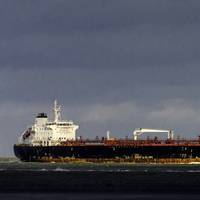
Oil exports from southern Iraq have fallen by 70,000 barrels per day (bpd) this month, according to shipping data and an industry source, suggesting OPEC's second-largest producer is heading for a third month of lower shipments. Southern Iraqi exports in the first 21 days of March averaged about 3.36 million bpd, compared to 3.43 million bpd in February, shipping data followed by Reuters and independent tracking by an industry source showed. The fall suggests there is still no…
Jawar Al Khaleej Takes Delivery of Two Vessels
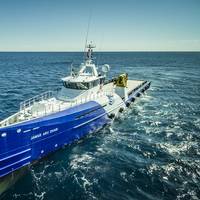
Jawar Al Khaleej Shipping LLC (JAK), a provider of specialist services to the offshore oil and gas sector in the Arabian Gulf, has taken delivery of a Damen Fast Crew Supplier (FCS) 5009 and an ASD 3213 tug for operations at the Al Basra (ABOT) and Khor Al Amaya (KAAOT ) oil terminals. Between them, these facilities handle more than 90 percent of Iraq’s crude oil exports. The FCS 5009 is named the Jawar Abu Dhabi and the ASD 3213 is the Jawar Faw. A second ASD 3213, the Jawar Um Qasr, is due for delivery shortly.
Jawar Al Khaleej Orders Three Vessels
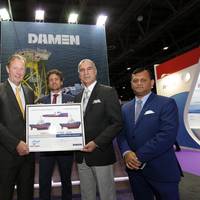
At this year’s Seatrade Maritime Middle East Exhibition taking place in Dubai, Jawar Al Khaleej Shipping LLC (JAK) signed a contract with Damen Shipyards Group for the supply of three vessels: one Fast Crew Supplier (FCS) 5009 and two ASD Tugs 3213. JAK is a provider of specialist services to the offshore oil and gas sector in the Gulf, delivering logistical support including oil terminal support services, towage and salvage, together with other integrated offshore solutions.
Marine Cybersecurity: Is Your Ship Safe? Are You Sure?

On February 12, 2013, President Obama issued Executive Order 13636 – Improving Critical Infrastructure Cybersecurity. Citing repeated electronic intrusions into critical infrastructure, the document states that it is the policy of the United States Government to increase the volume, timeliness, and quality of cyber threat information shared with U.S. private sector entities so that these entities may better protect and defend themselves against cyber threats. It directs the Secretary of Homeland Security (DHS)…
U.S. Defense Conducts Maritime Strike Ops
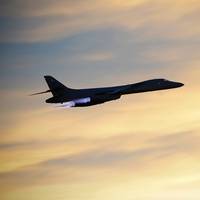
The looming threat of small boats to national security calls into play some innovative options. Since the horrific terrorist attacks of September 11, 2001 revealed a series of national security vulnerabilities, the U.S. Departments of Defense and Homeland Security have been exploring options to reduce these risks. One vulnerability that has proven difficult to address is that of an attack on U.S. assets and interests by small boats. The U.S. Air Force has recently conducted a successful test of its ability to neutralize and eliminate such a threat.
This Day in Coast Guard History – May 5
1947-The first meeting of the permanent International Civil Aviation Organization was held in Montreal, Canada with the Coast Guard being represented by LT John M. Waters, USCG. 1950-Congress approved the Uniform Code of Military Justice for the "government of the armed forces of the United States." 2004-On 5 May 2004 the Coast Guard presented the Purple Heart to BM3 Joseph Ruggiero in Miami for injuries sustained in action against the enemy while defending the Khawr Al Amaya Oil Terminal in Iraq on 24 April 2004. Ruggiero's shipmate, DC3 Nathan Bruckenthal, was killed in this same bombing and was posthumously awarded the Purple Heart. They were the first Coast Guard recipients of the Purple Heart since the Vietnam War. (Source: USCG Historian’s Office)
NAVFAC Awards Contract - Oil Platform Modifications
On Sept. 30, Naval Facilities Engineering Command Europe and Southwest Asia (NAVFAC EURSWA) awarded an $11.5 million contract modification for the Al Basrah (ABOT) and Khawr Al Amaya Oil Terminal (KAAOT) transfer platforms, located in the off the Iraqi shoreline. Work will include constructing a communications tower and installing generators on ABOT, as well as providing crane services and making structural repairs. Follow-on work early in FY09 will construct Containerized Living Units (CLUs) on ABOT to improve overall living conditions. URS-IAP LLC, of , was awarded a Design-Build Construction Modification 05 to task order N62470-06-D-6009-0003 of the Global Contingency Construction (GCC) contract for the Design-Build of Repairs and Improvements to ABOT and KAAOT.
Eye on the Fleet - U.S. Navy Photo of the Day
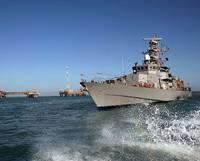
The coastal patrol craft USS Chinook (PC 9) conducts maritime security operations in the near the Iraqi Khawr Al Amaya oil terminal (KAAOT). Chinook is part of Combined Task Force (CTF) 158, which is specifically responsible for ensuring the security of 's KAAOT and Al Basra oil terminals in support of U.N. Security Council Resolution 1790. CTF-158 operates jointly with Iraqi Navy sailors and marines, trained by members of the Navy Transition Team based in nearby Umm Qasr. (Source: Navy News Service)
NMCB 4 Seabees Expending Energy on Oil Platforms
Seabees from Naval Mobile Construction Battalion (NMCB) 4 arrived to oil terminals located off the coast of Aug. 23 to work on living conditions and improve platform access. Few Seabees have had the opportunity of working on oil terminals, which are huge suppliers of the exported oil. Khawr Al Amaya Oil Terminal (KAAOT) and Al Basrah Oil Terminal (ABOT) are located in the northern . "It's kind of cool knowing that we are working on something that is so important to the world's economy," said Utilitiesman 2nd Class (SCW) Jason Grubbs. and coalition maritime forces provide assistance to the Iraqi Navy defending 's major oil platforms. These terminals are significant sources of Iraqi government revenue and contribute approximately 80 percent of 's gross domestic product.
Coast Guard Suffers First Combat Death Since Vietnam
U.S. Coast Guard Damage Controlman Third Class Nathan B. Bruckenthal, 24, from Smithtown, N.Y., died from injuries sustained when a small boat exploded as he and six other coalition sailors attempted to board it near the Iraqi Khawr Al Amaya Oil Terminal Saturday. Injured was Boatswains Mate Third Class Joseph T. Ruggiero, 23, from Revere, Mass., who is recovering in a hospital in Kuwait. The two men were assigned to Law Enforcement Detachment 403 from Tactical Law Enforcement Team South in Miami, Fla., and were deployed to Coast Guard Patrol Forces Southwest Asia at the time of the incident. Two Coast Guardsmen and five Navy sailors aboard a rigid hull inflatable boat were preparing to board a dhow that had approached the terminal when the explosion occurred. Two U.S.
Caution Advised When Offshore Iraq
The National Geospatial-Intelligence Agency (NGA) issued a Notice stating that mariners should exercise extreme caution when operating in the vicinity of Iraq’s Khawr al Amaya and al Basrah offshore oil terminals, which were recently attacked unsuccessfully by terrorists. Coalition maritime forces will continue to take all steps necessary to provide robust security for Iraqi resources. (HK Law)
Exclusion Zone Established in Iraqi Waters
The U.S. Maritime Liaison Office (MARLO) issued an Advisory stating that an exclusion zone has been established in Iraqi waters within 2,000 meters of the Khawr al Amaya and al Basrah offshore oil terminals. In addition, the right of innocent passage has been temporarily suspended in the same waters. Only oil tankers and support vessels authorized by terminal operators or coalition maritime security forces are allowed to enter the exclusion zones. Vessels attempting to enter the exclusion zones without authorization may be subject to defensive measures, including use of deadly force. Warning zones have also been established extending 3,000 meters from the outer edge of the two oil terminals. MARLO Advisory 06-04 (HK Law).
Revised Maritime Terminal Protection Procedures

A U.S. Marine stands security watch on the deck of the Al Basrah Oil Terminal (ABOT). U.S. Marines from the 1st Fleet Anti-Terrorism Security Team (FAST) Battalion, of Norfolk, Va., are providing extra security along with the Iraqi security teams after an attempted suicide attack on Iraqi oil terminals on April 25th. U.S. Navy photo by Photographer's Mate 1st Class Alan D. Monyelle. Commander, U.S. Naval Forces Command/Commander, U.S. 5th Fleet is taking further steps to increase…
Advisory re: Iraqi Oil Terminals
The National Geospatial-Intelligence Agency (NGA) issued an Advisory recommending that oil tankers preparing for lift operations at Iraq’s offshore Al Basra and Khawr Al Amaya oil terminals not utilize the terminals’ deep-water anchorage. Coalition forces cannot provide the same level of security at the anchorage as they can at the terminals. Given the obvious economic target presented by idle oil tankers assembled in a contained area, owners and operators are strongly encouraged to discontinue use of the deep-water anchorage. (HK Law).
USS Yorktown Returns to Pascagoula, Completes Final Deployment

USS Yorktown (CG 48) will return home to Naval Station Pascagoula Aug. 17, after a successful six-month deployment with the USS Wasp (LHD 1) Expeditionary Strike Group (ESG) 2. Yorktown made key contributions to Operations Iraqi Freedom, Enduring Freedom, and Market Time II in support of the global war on terrorism. The ship, with embarked Helicopter Squadron Light (HSL) 42 Det. 2 from Mayport, Fla., set sail Feb. 17 from Pascagoula, and rendezvoused with the rest of the strike group off the coast of North Carolina three days later.
NAVCENT Marks Oil Platforms Upgrades
By Mass Communication Specialist Seaman Josh Cassatt, Commander, U.S. Naval Forces Central Command/Commander, U.S. Vice Adm. Kevin Cosgriff, commander, U.S. Naval Forces Central Command/U.S. 5th Fleet and Royal Australian Navy Commodore Allan du Toit, commander, Combined Task Force (CTF) 158, visited Iraq's Khawr Al Amaya Oil Terminal (KAAOT) Nov. 16, for a ribbon-cutting ceremony celebrating the implementation of facility upgrades. The most significant improvement on KAAOT was the installation of the Tactical Operations Center (TOC), which will serve as a permanent centralized command and control location to enhance Coalition coordination.
Royal Navy Hands Over Combined Task Force 158 to U.S. Forces
Rear Adm. Garry E. Hall relieved Royal Navy Commodore Nick Lambert as commander of Combined Task Force (CTF) 158 and Capt. Paul Severs relieved Royal Navy Capt. Bob Sanguinetti as commander of Combined Task Group (CTG) 158.1 on July 17 aboard Ocean 6, an afloat forward operating barge in the north Persian Gulf. Command of CTF 158 typically rotates among coalition partners Australia, United Kingdom, and the United States. CTF 158 is comprised of coalition ships and its primary mission in the Gulf is maintaining security in and around both the Al Basrah and Khawr Al Amaya Oil Terminals -- ABOT and KAAOT, respectively -- in support of U.N. Security Council Resolution 1723.
Strike Group Commanders Visit Oil Terminals
As the sun-sets over the Khawr Al Amaya Oil Terminal (KAAOT), another day passes safely under the watchful eye of masters-at-arms assigned to Mobile Security Detachment Two Five (MSD-25). MSD-25 members are currently training the Iraqi military on proper watch standing and security procedures during their six-month deployment to the Iraqi oil terminals. Mobile Security Detachment Two Five is combining efforts with coalition forces under the flag of Commander Task Force Five Eight (CTF-58) in support of maritime security operations (MSO) by standing security watches on KAAOT and Al Basrah Oil Terminal (ABOT). U.S. From U.S. Naval Forces Central Command/U.S. Two U.S.
USS Howard Departs Persian Gulf
USS Howard (DDG 83) completed conducting maritime security operations (MSO) on Feb. 28 for Combined Task Force 158 in the North Persian Gulf in support of U.S. 5th Fleet. Howard, along with other coalition ships, guarded Iraq’s Al Basrah Oil Terminal (ABOT) and the Khawr Al Amaya Oil Terminal (KAAOT) off the southern coast of Iraq. As a part of the USS Boxer (LHD 4) Expeditionary Strike Group (BOXESG), Howard was responsible for coordinating MSO around the Al Basrah oil platform. MSO help set the conditions for security and stability in the North Persian Gulf and protect Iraq’s sea-based infrastructure, which provides the Iraqi people the opportunity for self-determination.
MSD 71 Completes Tour Aboard Oil Platforms
Mobile Security Detachment (MSD) 71 concluded a successful six-month deployment here Oct. 1, in which it provided security for Iraq’s Al Basrah (ABOT) and Khawr Al Amaya (KAAOT) oil terminals. The Guam-based Sailors, who are part of Combined Task Force (CTF) 158, worked closely with the Iraqi marines, also stationed aboard the oil terminals, to secure the waters surrounding the oil platforms. MSD 71 Sailors provide Iraqi marines with close-in point defense operations training and other effective security techniques. This intensive training is designed to train the Iraqis to eventually protect the oil platforms and territorial waters without oversight or support from coalition forces.
Ocean 6 Conducts Operations with BOXESG
Combined Task Force (CTF) 158 command and control center’s afloat forward staging base, known as Ocean 6, conducted maritime security operations (MSO) in the North Persian Gulf with USS Boxer (LHD 4) Expeditionary Strike Group (BOXESG), Nov. 21-24. Ocean 6, a converted civilian barge, is a central command and control hub for MSO in the North Persian Gulf. U.S. Sailors assigned to Ocean 6 coordinate all MSO activity with coalition ships in the North Persian Gulf. Its primary mission is the protection of Iraq’s oil platforms by coordinating U.S. and coalition forces for optimum defense, tactical operations and intelligence gathering in the region.
MSD 71 Supports Maritime Security Operations
Forward deployed Sailors attached to Mobile Security Detachment (MSD) 71 are currently deployed to Iraq’s two critical oil platforms, the Al Basrah (ABOT) and Khawr Al Amaya (KAAOT) oil terminals, conducting maritime security operations (MSO). As a part of Commander, Task Force (CTF) 158, MSD 71, based in Guam, arrived on station April 9 to train and work alongside Iraqi marines in point defense operations of the oil terminals. “We act in a Military Training Team mode and oversee their day-to-day operations to ensure that they’re securing the platforms in accordance with the procedures established for the inner defense layer of the terminals,” said Lt. Cmdr. Kenneth Miller, MSD 71 officer in charge.
Navy, Coast Guard Join Forces in Persian Gulf
Quick and maneuverable, U.S. Navy and Coast Guard patrol boats have become an integral part of maritime security operations (MSO) in the Persian Gulf. As part of Commander, Task Group (CTG) 158.1, the patrol boats are conducting MSO, which help set the conditions for security and stability in the North Persian Gulf and protect Iraq's sea-based infrastructure to help provide the Iraqi people the opportunity for self-determination. U.S. Navy 170-foot Cyclone-class Coastal Patrol (PC) ships and Coast Guard 110-foot Island-class patrol boats (PB) can reach their destinations faster and navigate in and out of shallower waters than larger Navy ships. PCs typically remain forward deployed for long periods of time in the Persian Gulf, while their crews are swapped out every six months.












